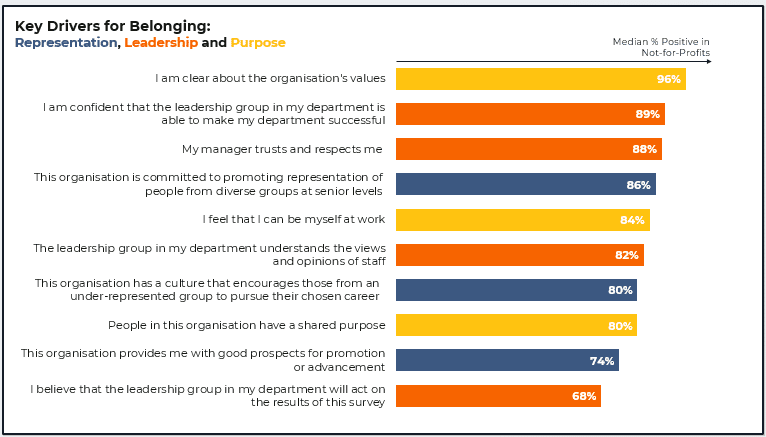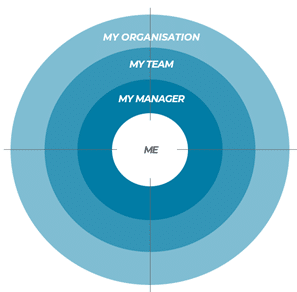
Insights
Helping not-for-profit organisations develop and sustain
the highest levels of employee and volunteer engagement

Insights
‘Belonging’ is far from a new concept in our workplaces – it has even joined the ranks of Diversity, Equity/Equality and Inclusion in the acronym DEIB. But, although we all want to feel it, a sense of belonging can be seen as a vague and unhelpful goal for organisations to shoot for.
We know that belonging matters: it is a fundamental psychological need (the third tier in Maslow’s famous hierarchy) and it is tied into employee engagement.
More than just the sum of an organisation’s DEI initiatives, a sense of belonging captures when employees feel engaged, valued, enabled and empowered.
We dug into our data to find out what is driving belonging in not-for-profit organisations. What are the levers you can pull to cultivate a sense of belonging, and reap the benefits?

This chart shows the 10 questions most closely correlated with “I feel like I belong at this organisation”.
Three key dimensions emerged from this data: Representation, Leadership, and Purpose/Empowerment
Individuals are more likely to feel that they belong in organisations where they are provided with good prospects for promotion or advancement – and there’s a substantial range in how well organisations perform on that question.
Belonging is also higher in organisations whose staff feel they are committed to promoting representation of diverse groups – to senior levels or along other career paths.
Representation and equitable opportunities are key elements for organisations focused on improving DEI.
This data shows that when you make efforts to support under-represented groups, that has a positive knock-on effect for everyone. The prospects for advancement become more transparent and accessible, and staff can see a place where they fit in.
Three questions that drive a feeling of belonging for employees of not-for-profits related to the leaders of departments(/divisions/regions/etc.):
When local leadership can demonstrate understanding of frontline needs and perspectives, and take action to make things better, staff feel heard and included.

A sense of belonging at the team-level relies on good relationships with colleagues, and the culture created by departmental leaders.
A sense of purpose is an important dimension of wellbeing, as well as of employee engagement.
Having a clear understanding of your organisation’s goals, direction, values and purpose can help to sustain motivation – and without that understanding, it’s hard to know whether or not you belong.
Leaders play a key role in setting the tone, but an organisation’s values must be lived at every level if they’re going to feel real.
When people share a sense of purpose, their social relationships are stronger and it is easier to collaborate: teams have more team spirit. And because of stronger ties, people are more likely to feel supported to be themselves at work. This psychologically safe environment is a crucial precursor to feelings of belonging.
If your organisation is aiming to create a culture of belonging and inclusion, the data tells us to focus on equitable career opportunities, equipping local managers and department leaders, and curating a shared sense of purpose through shared values.
In order to measure progress on this mission to cultivate inclusion and belonging, make sure to include these important questions in the chart above in your next employee engagement survey, or even in a DEIB-focused pulse survey.
For support and guidance on developing your employee listening programme or to speak to a survey expert, get in touch – we’d be delighted to hear from you.
5 Linford Forum
Rockingham Drive
Milton Keynes
MK14 6LY
UK
Company No: 4509427
